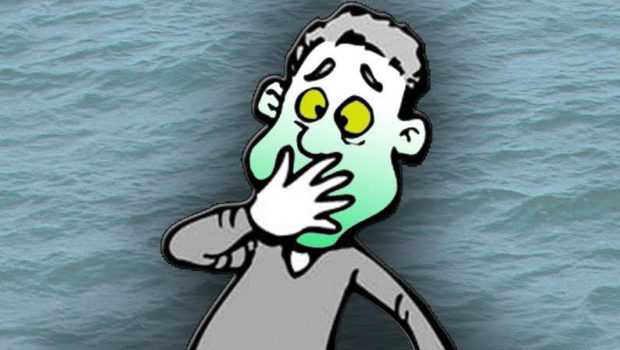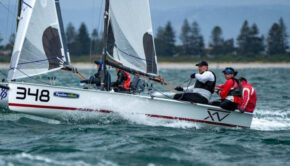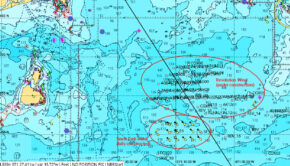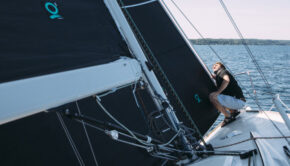Choose Option Two for Seasickness
Published on May 31st, 2016
When the 635-mile Newport Bermuda Race starts on June 17, the fleet will number 192 boats, making the 2016 edition the third largest race in the 110-year, 50-race history. For the participating crew, experienced offshore sailor Chris Museler provides the following advisory on avoiding and treating seasickness…
I had never been seasick before the 2012 Newport Bermuda Race—or at least before I started preparing for that race. In a gale off Hatteras that spring (yes there’s always a gale off Cape Hatteras in the spring), I was trying to sleep on the cabin sole of a bucking Class 40 double-hander. The fuel vents were squirting diesel and a small pool was accumulating behind my head. So ended my no-seasickness record.
In that year’s Bermuda Race there were no diesel puddles–yet “it” happened again. After I missed two watches, and after my co-skipper suggested I take a rectal suppository of anti-seasickness medication, I worked hard to recover, sipping diluted Gatorade and getting some rest. That did the trick, and the experience persuaded me that every sailor has to choose between two options: Either figure out how to recover from seasickness, or take steps to prevent it. I chose option two.
It takes effort. When preparing for this year’s Bermuda Race, each sailor (no matter how “iron” their stomach is) should put some thought into seasickness prevention. Most people in the race are stepping into the long ocean passage cold because they haven’t been at sea for months, if not years. The four or so days it takes to get to Bermuda can be barely enough time to get acclimated to the boat’s motion. Another feature of seasickness that concerns many Bermuda racers is that, as we age, we may become more susceptible.
Prevention is the key. In an article in this year’s Bermuda Race Program, Dr. Jeffrey Wisch outlines the ins and outs of seasickness. His article is called “The Sailor’s Plague” for good reason: seasickness is contagious. Remember that scene from “Stand By Me” at the pie-eating contest? One person threw up and started the famous barf-o-rama. Dr. Wisch’s excellent article is at page 24 in the online Race Program.
Dr. Wisch says this illness is downright dangerous. Seasickness can cascade into a very serious situation, leaving your fellow crewmembers overburdened if not desperate. In that 2012 race, a double-handed sailor became so ill and dehydrated that he had to be picked up from the boat hundreds of miles from land. That required his buddy to finish half the race singlehanded (he beat us, grrr).
My active methods to avoid seasickness derive mainly from common sense and the age-old tips we have all heard. Stay above deck when you can. Keep an eye on the horizon. Stay busy. When you’re below, lie down and get to sleep as quickly as possible. Try to acclimate your body to the motion of the boat. Many of us feel sleepy the first few hours at sea. Ideally we could all just lie down and take a nap while our body tunes into to the motion. But the first hectic hours of the Bermuda Race, jostling around Castle Hill Light and tacking out of Narragansett Bay, don’t provide much free time for rest.
When I do lie down for an off watch, I either nibble on something crunchy and dry like nuts or a granola bar, or suck on a Rolaids tablet to calm my stomach. I keep all those items close by along, with my toothbrush in a small personal sack that I can hang next to my bunk.

Chris’s Personal Care Pack: Band-Aids, Neosporin, Advil (for sore muscles), Aleve (for sore back), Tums, Bonine (meclizine, anti-seasickness), cough drops (coughs keep you and crew awake on an off watch), tooth care. © Chris Museler
My second line of defense has become Meclizine, an anti-motion sickness drug in a chewable form. I use the brand name Bonine. I tested this out before my first use in 2013 and I begin taking it the night before an offshore race. After making sure I have enough for an extended time at sea (like a Bermuda Race), I take one Bonine a day until the finish. This has seemed to work well for me. My children use Dramamine chewables for kids if we are cruising in the open ocean.
There are many other anti-seasickness medications. The Scopolamine “patch” is popular but needs to be tested before going on a boat as there can be bad reactions. Most medications have side effects. Which is why it’s a good idea to consult your doctor. Dr. Wisch also recommends Scopolamine as a remedy after someone has become ill. Other common remedies Include: Scopolamine, Dramamine, Stugeron (available only from drugstores outside the US), and Sea Band.
Andy Schell, a professional offshore sailing instructor and host of the 59North podcast about sailing, recently gave me a few tips about preventing and curing seasickness. Some were surprising. He said make sure you drink lots of water when you are offshore and also always keep a little food in your stomach, even if you don’t have an appetite. This keeps you hydrated and nourished, either helping to prevent seasickness or at least to lessen the duration. And, as he mentioned, “At least you have something to throw up.”
The next thing he mentioned seems logical but it’s difficult in practice: try not to drink coffee. Few have the willpower to follow this tip, but Andy says caffeine causes trouble. Mini Transat winning solo sailor Benoit Marie stays away from caffeine completely, saying, “It keeps you from falling asleep when you really need to sleep.”
Andy adds, “Don’t drink any alcohol the day before the race—especially wine.” Dr. Wisch concurs. That’s a tough one as we are all excited before taking off on a Bermuda Race. But this year I will observe this rule. As we all know, there are plenty of Dark ’n Stormies at the other end.
Over the Memorial Day weekend I joined my Bermuda Race team aboard Simon Says for the 186-mile Block Island Race. I hadn’t been offshore for almost a year. I used the personal techniques mentioned above to keep from getting seasick, and I also tried some new ideas.
I took both of Andy’s recommendations: I didn’t have any alcohol the day before the start, and I stayed away from coffee before and during the race. The latter had noticeable effects. I was able to go to sleep quicker than I had in the past when I lay down for my first off watch. The rest of the crew had difficulty falling asleep until well into the race. I did feel a tad queasy while I was packing a wet spinnaker below at night while the boat was pounding to windward . I made quick work of it and was able to lie down immediately afterwards. Soon I was asleep.
Though the Atlantic can throw more at your body than Long Island Sound, this was a good warmup and I plan on sharing my techniques with my shipmates and keeping these lessons always in mind as conditions get rough during our upcoming Bermuda Race.









 We’ll keep your information safe.
We’ll keep your information safe.